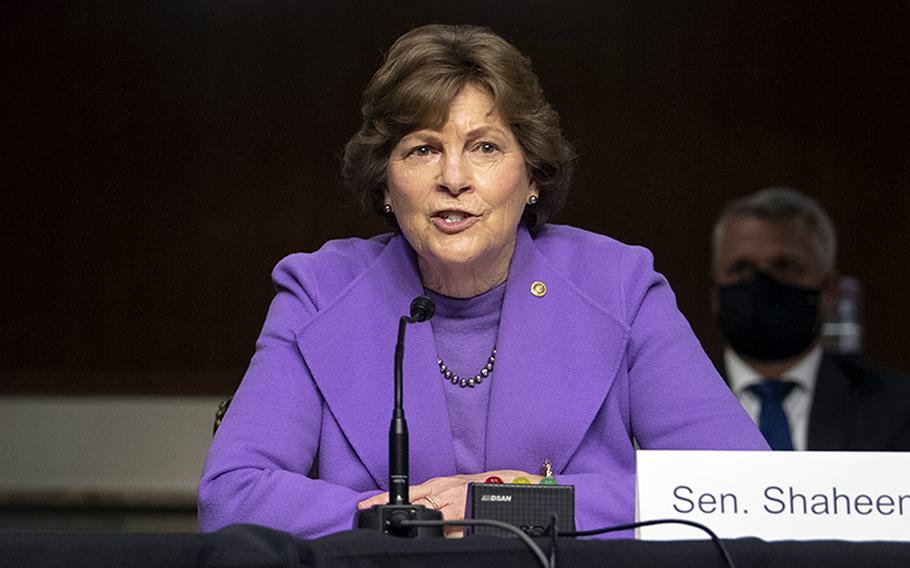
Sen. Jeanne Shaheen, D-N.H., seen here during a Senate hearing last year, said Dec. 20, 2022, that a last-minute deal led to the Senate adding provisions to a spending bill that extends the Special Immigrant Visa program through 2024. (EJ Hersom/Defense Department)
A program that resettles Afghan interpreters who worked with U.S. forces is no longer on the chopping block, congressional lawmakers said Tuesday.
A last-minute deal led to the Senate adding provisions extending the Afghan Special Immigrant Visa program through 2024 into the omnibus spending bill that funds the federal government, Sen. Jeanne Shaheen, D-N.H., said in an email.
“I appreciate the round-the-clock work of numerous lawmakers to see this through, which will protect the path to safety that we promised our Afghan allies who served beside U.S. troops and diplomats in Afghanistan,” Shaheen said Tuesday.
The program’s end date has been changed to Dec. 31, 2024, and an additional 4,000 visas have been allotted, according to the omnibus bill text released Tuesday.
The number of allotments is in line with previous reauthorizations, which has typically averaged around 4,000 a year since 2017.
Language extending the SIV program had been removed from the separate National Defense Authorization Act, an statement accompanying that bill in December said.
The move led to sharp criticism by Democrats and advocacy groups directed at Republican lawmakers said to be against the program, specifically Sen. Charles Grassley.
The Iowa Republican has long raised objections over what he has said were lax criteria for SIV program eligibility. Grassley’s office declined comment Tuesday, but in an interview in August a spokesman said other Republicans in the Senate and House had voiced similar concerns.
The program, which began in 2009, resettles Afghans and Iraqis and their family members who face risks to their lives because of their previous work with the U.S. government. The SIV program received $1 billion from the Senate in 2021 as part of an emergency spending bill.
Although Iraqi interpreters who worked with U.S. troops are also eligible for the visas, Afghans make up the vast majority of applicants, especially after the Taliban conquered the U.S.-backed government in Kabul last year.
Jeff Phaneuf, advocacy chief at the Virginia-based nonprofit No One Left Behind, applauded the Senate’s renewal and extension of the SIV program in the omnibus bill.
“More remains to be done to aid the thousands of our combat allies still left behind,” Phaneuf said, adding he hopes lawmakers will establish a permanent SIV program for past and future interpreters.
Another bill, the Afghan Adjustment Act, which provides permanent legal status to Afghans outside the SIV program or the asylum system, remains under debate in Congress.
CNN reported Monday night that the legislation will not be included in the omnibus bill because of Grassley’s objections at the committee level.
The bill faces opposition by some Republicans, who say the security procedures in it are not stringent enough.
Resettlement advocacy groups on Tuesday decried the omission of the Afghan Adjustment Act in the Senate’s omnibus package.
“Despite many legislative opportunities and three separate White House requests, Afghans in the U.S. will remain subject to the anxiety and stress of unnecessary legal limbo,” said Krish O’Mara Vignarajah, president of Lutheran Immigration and Refugee Service, in an emailed statement Tuesday.
“The glaring omission of this bill is an epic failure to seize on practical solutions that enjoy broad, bipartisan support,” Vignarajah added.
Jeremy Butler, head of the New York-based group Iraq and Afghanistan Veterans of America, on Tuesday called the exclusion of the Afghan Adjustment Act from the spending bill “a tragic mistake.”
Advocates for the SIV program and the Afghan Adjustment Act have described the actions as part of keeping promises to those who aided U.S. troops during their 20-year war in Afghanistan.
Besides the Afghans who worked as interpreters, the U.S. employed tens of thousands of third-country nationals on its bases in Afghanistan. It is likely that many of those workers or their families never received compensation for injuries and deaths due to them under the Defense Base Act, a Brown University study released Tuesday found.
The study by the Costs of War project found at least a dozen instances of Nepali workers who weren’t properly compensated, after conducting interviews and reviewing documents obtained under the Freedom of Information Act.
From 2009 to 2021, the Labor Department fined contractors employing third-country national base workers who failed to report claims six times, which amounted to a combined total penalty of $3,250, the study found.